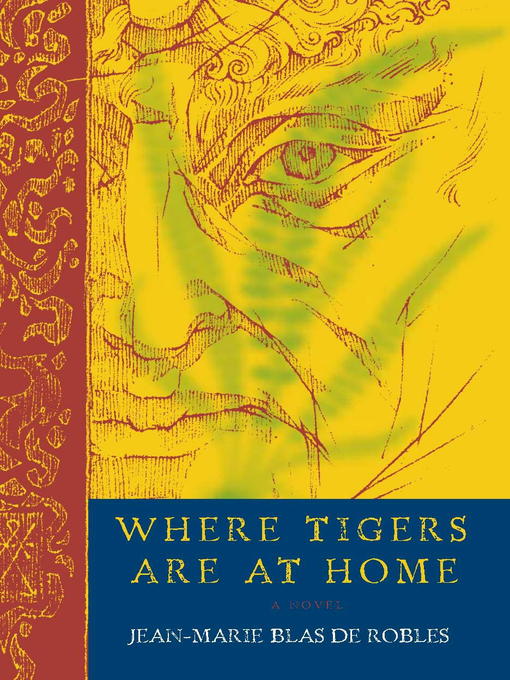
Where Tigers Are at Home
A Novel
کتاب های مرتبط
- اطلاعات
- نقد و بررسی
- دیدگاه کاربران
نقد و بررسی

October 29, 2012
Writing in French a story set in Brazil, Blas de Roblès simultaneously channels Umberto Eco, Indiana Jones, and Jorge Amado in his internationally acclaimed 800-plus–page riff on science, civilization, and self-interest. Fact and fiction interweave through alternating narratives: a French journalist attempts to translate a 17th-century manuscript recording the life of real-life Jesuit scholar Anathasius Kircher as seen through the eyes of his private secretary; the journalist’s ex-wife searches for rare fossils in the Amazon rain forest; the journalist’s daughter seeks oblivion in drugs and sex; Nelson, a 10-year-old crippled beggar, exists among the dregs of society; Carlotta, wife of a corrupt politician, entertains the elite. The novel opens with journalist Eléazard von Wogau reading about Kircher’s wide-ranging academic studies and acquaintances with figures like Bernini, Galileo, and Sweden’s Queen Christina. But what begins as a faux metabiography turns to picaresque adventure with erotic escapades, scams, and unexpected changes of fortune: Elaine von Wogau’s geological expedition is attacked in the jungle and must seek refuge among headhunters, while her daughter, Moéma, spirals downward into addiction. From a foul-mouthed macaw to Leonardo’s flying machine, this sprawling novel depicts “the absurdity beneath which the criminal stupidity of men generally hides.”

February 1, 2013
Psychodrama meets history meets mystery--vintage Umberto Eco territory, as practiced by French philosophy professor turned novelist Blas de Robles. Athanasius Kircher is Eco territory, too. That is to say, in many interviews centering on his bibliophilia, Eco cites his vast collection of material written by and relating to the 17th-century Jesuit polymath. He presumably won't mind that Blas de Robles has appropriated his great hero and precursor, for there are no derivative notes in this inventive story, a sort of dream voyage into both present and past. Eleazard von Wogau, a French expat in Brazil, has been digging deep into the work of Kircher "with the same obsessiveness as some people collect bottles of whisky or cigarette packets long after they've stopped drinking or smoking." As he does, his orderly life begins to dissolve ever more completely; his wife leaves him, his daughter disappears, and von Wogau himself begins to lose track of the dividing line between Kircher's life and time and his own, Kircher's biography steadily filling the space in which his own story might have been told. It's a perfectly fitting setup, given, as Blas de Robles notes, that in his day, Kircher faced accusations "of black magic by some simple or jealous people." This densely woven tale is anything but simple, however, and the reader approaching it should be prepared for abundant shape-shifting and time-shifting. The payoff is not just the enjoyment of a craftily written historical novel with detective-story undertones, but also plenty of cocktail-party-worthy trivia: "Zoroaster was not a man but a title, the one given anyone who concerned himself with knowledge of the arcana & magic." "[A]ccording to Servius, the word for elephant in the Punic language is 'kaisar.' " "A chicken, Caspar, a poulet, a pou-let! Don't you get it?" If you're a fan of Foucault's Pendulum and its kin, you'll enjoy Blas de Robles' concoction.
COPYRIGHT(2013) Kirkus Reviews, ALL RIGHTS RESERVED.

February 15, 2013
A well-traveled academic and lecturer in both philosophy and archaeology, Blas de Robles offers a sprawling novel that echoes the scope of such writers as Haruki Murakami or Umberto Eco. Once this backstory is understood, readers have an idea of where they are headed: over time, over continents, and over the moon and back again. The story begins in Brazil, where French scholar and retired correspondent Eleazard von Wogau is studying the life of 17th-century Jesuit scientist Athanasius Kircher. As von Wogau's former wife begins a dangerous jungle expedition, their daughter takes on an equally dangerous journey involving drugs and sexual experimentation. In addition, the very rich and the very poor of Brazilian society each play a part in this drama, which freely roams the territory between the personal and the abstract. VERDICT Blas de Robles, who won the Prix Medicis for this work, presents an absurdist literary narrative for readers who have the patience and persistence to stay with him on this long, strange, mind-bending trip.--Susanne Wells, Indianapolis P.L.
Copyright 2013 Library Journal, LLC Used with permission.

Starred review from February 1, 2013
Late in de Robl's' remarkable novel, a tribal shaman chants, Soon the Messenger will guide us to that mountain where visions cascade down uninterruptedly. This dazzling book is itself such a mountain, overflowing with visions that dramatically enlarge the reader's imaginative horizons. At the narrative confluence of these surging visions, de Robl's places the complex psyche of El'azard von Wogau, a French journalist living in Brazil, spending his retirement editing the manuscript of a biography of a seventeenth-century Jesuit, a polymath whose life trajectory exposes theological passions, alchemical secrets, and sensual appetites. Unsettled by the serpentine turns in the life of this dead cleric, El'azard struggles to cope with the more immediate influence of an ex-wife venturing into a perilous rain forest to do archaeological research and a mercurial daughter hitting the beach with a lesbian lover and a freethinking professor. As El'azard teeters on the brink of insanity, readers may find their own grip on reality slipping away in a vortex of literary enchantment that fuses arcane scholarship, polymorphic sex, exotic geography, psychedelic drugs, and gruesome violence. Thanks to a gifted translator, English-speaking readers can now understand why European critics have been raving over this astonishing novel, winner of the Prix M'dicis.(Reprinted with permission of Booklist, copyright 2013, American Library Association.)

























دیدگاه کاربران